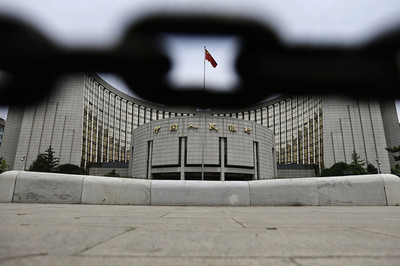(单词翻译:单击)
China has approved HSBC, Morgan Stanley and 30 other foreign institutions to invest in its $5.9tn domestic bond market, a big step towards opening its capital markets to foreign investment.
中国已批准汇丰(HSBC)和摩根士丹利(Morgan Stanley)等30多家外资机构投资其5.9万亿美元规模的境内债券市场,从而朝着向外资开放资本市场迈出一大步。
China has expanded foreign access to its stock market in recent years, but liberalisation of the domestic bond market — the world’s third-largest, behind the US and Japan — has proceeded more slowly. Economists say loosening restrictions on bond investment is crucial if China wants to persuade international investors to store their savings in renminbi. Heavyweights such as central banks, sovereign wealth funds, insurers and pension funds have portfolios weighted towards fixed income.
近年来,中国已扩大了外资对境内股票市场的准入,但境内债券市场的自由化则进展更慢。中国债券市场是仅次于美国和日本的世界第三大债券市场。经济学家们表示,如果中国想要说服国际投资者以人民币储蓄,那么放松对债券市场的管制是至关重要的。各国央行、主权财富基金、保险公司和养老基金等重量级机构,都在其投资组合中纳入相当大权重的固定收益产品。

The approvals also come as China’s slowing economy and falling domestic interest rates spur capital outflows. Expanding inbound bond investment could help hedge against this.
中国采取此举之际,国内经济放缓以及利率下降正刺激资本外流。扩大外资投资境内债券可能有助于对冲这一趋势。
Standard Chartered estimates that more than 50 central banks already hold some renminbi bonds among their foreign currency reserves.
据渣打(Standard Chartered)估算,全球逾50家央行已在其外汇储备中持有一定的人民币债券。
Many of these hold “dim sum” bonds traded in Hong Kong, which do not require Beijing’s approval, but foreign holdings of onshore bonds are also on the rise. Offshore institutions held Rmb579bn ($93bn) in interbank bonds by the end of March, up 44 per cent from a year earlier, according to China’s two main bond clearing houses.
许多央行持有在香港交易的“点心债”——这不需要得到北京方面的批准,但外资机构对中国境内债券的持有量也在上升。根据中国两家主要的债券清算机构的数据,截止今年3月底,海外机构持有的银行间债券规模达5790亿元人民币(合930亿美元),同比增加44%。
The People’s Bank of China issued rules in 2013 allowing institutions that had already been approved to buy into domestic stock exchanges to apply for access to the interbank bond market, where more than 90 per cent of all Chinese domestic bonds are traded.
2013年,中国央行(PBoC)发布了规则,允许已获准在境内股市购买股票的机构申请进入银行间债市,90%以上的中国境内债券交易发生在银行间债市。
That created an opening for the several hundred institutions approved under the qualified foreign institutional investor (QFII) programme and a related scheme for offshore renminbi (RQFII) to diversify into bonds.
此举为几百家已获准通过合格境外机构投资者(QFII)和相关的人民币境外合格机构投资者(RQFII)计划进入中国股市的机构打开一个口子,让它们也能进入境内债券市场。
The approvals come with quotas restricting the amount that can be invested, but Beijing does not disclose them. Before the latest approvals, 24 QFIIs, 86 RQFIIs, and an unknown number of foreign central banks and renminbi trade settlement banks had been approved.
相关批准规定了投资额度,但北京方面并不宣布额度有多大。在最近一波批准之前,24家QFII机构、86家RQFII机构以及数量未知的外国央行和人民币贸易结算银行已获得批准。
A separate programme allows foreign central banks that have signed bilateral currency swap agreements with the PBoC, as well as overseas banks involved in cross-border renminbi trade settlement and clearing, to apply for access to the interbank bond market.
还有一个并行的计划允许与中国央行签署了双边货币互换协议的外国央行——以及参与跨境人民币贸易结算与清算的海外银行——申请进入银行间债市。
In recent days, the PBoC approved 32 new foreign investors under these two programmes, including HSBC, Morgan Stanley, Société Générale, BNP Paribas and ING Bank, according to the Shanghai Clearing House.
上海清算所(Shanghai Clearing House)表示,近几天,中国央行在两个计划下批准了32家新的外国投资机构投资国内债市,其中包括汇丰、摩根士丹利、法国兴业银行(Société Générale)、巴黎银行(BNP Paribas)和荷兰商业银行(ING Bank)。
In addition to hedging against capital outflows, the latest approvals may be an attempt to maintain the relevance of QFII following the launch of a rival programme that also allows foreign investors to buy mainland stocks.
除了对冲资本外流,最新批准举措或许意在维持QFII计划的相关性,因为此前中国推出了一个与之竞争的允许外资投资境内股市的计划。
The Shanghai-Hong Kong Stock Connect, launched in November, created a new channel for foreign investors to buy large-cap stocks traded in Shanghai, up to a quota of Rmb300bn ($48bn), with no preapproval required.
去年11月中国推出的沪港通(Shanghai-Hong Kong Stock Connect)为境外投资机构购买上海股市的大型股提供了一条新渠道,最高额度达3000亿元人民币(合480亿美元),且无需预先审批。
Even before the stock connect launched, demand for QFII appeared tepid. About half of the $150bn QFII quota and 60 per cent of the Rmb300bn RQFII quota remained unused by the end of April, according to China’s foreign exchange regulator.
即使在沪港通启动之前,对QFII的需求似乎就不温不火。中国外汇监管机构的数据显示,截止今年4月底,1500亿美元QFII额度的约一半以及3000亿元人民币RQFII额度的60%尚未使用。


